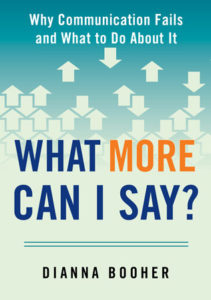


(Forbes first ran my article here.)
Like many in the workforce today, you may struggle against a nagging thought: This is not where I want to be or what I want to do for the rest of my life.
Frustration about time and balance stems from the conflict between what we believe and value… and what we actually do and have.
We value time with our children, but we have to work long hours or travel in our job.
We enjoy spending time with our spouse, yet our weekends are filled with running errands in opposite directions just to get “caught up” and ready to go again the next week.
We value the emotional support from friends, but we never have time to carry on intimate conversations about real problems and issues in our lives or purposeful, fulfilling pursuits.
We value good health, but we seldom find time to exercise, or we eat unbalanced meals that add calories without nutrition. As a result, we often feel tired and sick, leaving us less capable of fighting off the plethora of illnesses that come along.
We consider serving God a privilege and a duty, but we don’t spend time in worship and we don’t get involved personally in meeting needs as “God’s hands on earth.”
We value making a significant contribution to our organization, but we work for a micromanager who restricts creative thinking and discourages risk-taking that might pay off.
We value leisure time, yet we don’t make enough money to pay for travel or hobbies that would fulfill us—or fear for our safety in the era of viruses and terrorism.
We value being recognized for accomplishments, but the company doesn’t have a consistent reward or recognition plan.
We value learning new skills, but the leadership team doesn’t offer consistent, clear feedback—much less professional development opportunities.
We value intellectual growth, but we don’t have time to read and engage in meaningful conversations.
We value teaching our children about the world, but either we’re totally “locked down” or the kids are so distracted by social media or other scheduled activities that some days we’re lucky to get more than a few texts with them.
We value creativity, but our job allows only routine activities to maintain the status quo.
We believe that good citizens participate in government, yet we don’t have time to study the various platforms and voting records of those running for office. So either we don’t vote, or fall for propaganda and make an uninformed choice.
We value service to others, but we regret failing to volunteer for charitable causes.
These values come from our belief system developed throughout childhood and early adulthood. After weeks, months, and years of not being able to live like you want and have what you want, you feel like a traveler who packed for the wrong trip. All the want-tos are packed inside your head and heart, but you never get to “wear” them.
Instead of feeling angry and resentful, make up your mind to change what you have and what you do. You can make changes.
When my husband and I married, he valued his “stuff”—his furniture, his keepsakes from trips, his momentos from past jobs. And when we began the process of selling both houses and packing our “stuff” to move into one house, we had quite a struggle about what to discard and what to keep. I had a new lamp; he had an old lamp. Logic said to keep the new lamp and donate the old one. But logic wasn’t the issue. After living alone for seventeen years, his “stuff” defined him. Because he had no children, his physical possessions took on great value.
But as his relationship with my children grew, he needed his “stuff” less and less. The value he used to place on “stuff” has been reallocated to significant relationships that he now values much more.
People who have successfully realigned time and activity with their values say they have accomplished or learned the following. They
Just as your car shimmies and shakes when its wheels get out of balance, your own sense of well-being reacts when it’s out of balance. Although not as easy as taking your car into the repair shop for a wheel realignment, you can realign yourself if you set your mind to it.
Soren Kierkegaard summed up the miserable, out-of-sorts feeling this way: “The greatest despair is not to become the person you were meant to be.”
Maybe you would even agree with Louis Agassiz: “I cannot afford to waste my time making money.” If so, have the courage to break the high-salary handcuffs, take stock, and take action to find your calling in life!
Learn more ways to communicate effectively what you need in life with What More Can I Say: Why Communication Fails and What to Do About It.
